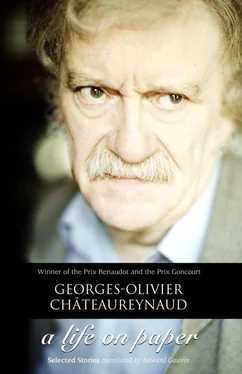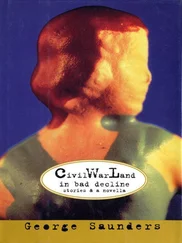Georges-Olivier Chateaureynaud - A Life on Paper - Stories
Здесь есть возможность читать онлайн «Georges-Olivier Chateaureynaud - A Life on Paper - Stories» весь текст электронной книги совершенно бесплатно (целиком полную версию без сокращений). В некоторых случаях можно слушать аудио, скачать через торрент в формате fb2 и присутствует краткое содержание. Год выпуска: 2010, Жанр: Современная проза, на английском языке. Описание произведения, (предисловие) а так же отзывы посетителей доступны на портале библиотеки ЛибКат.
- Название:A Life on Paper: Stories
- Автор:
- Жанр:
- Год:2010
- ISBN:нет данных
- Рейтинг книги:4 / 5. Голосов: 1
-
Избранное:Добавить в избранное
- Отзывы:
-
Ваша оценка:
- 80
- 1
- 2
- 3
- 4
- 5
A Life on Paper: Stories: краткое содержание, описание и аннотация
Предлагаем к чтению аннотацию, описание, краткое содержание или предисловие (зависит от того, что написал сам автор книги «A Life on Paper: Stories»). Если вы не нашли необходимую информацию о книге — напишите в комментариях, мы постараемся отыскать её.
A Life on Paper
A Life on Paper: Stories — читать онлайн бесплатно полную книгу (весь текст) целиком
Ниже представлен текст книги, разбитый по страницам. Система сохранения места последней прочитанной страницы, позволяет с удобством читать онлайн бесплатно книгу «A Life on Paper: Stories», без необходимости каждый раз заново искать на чём Вы остановились. Поставьте закладку, и сможете в любой момент перейти на страницу, на которой закончили чтение.
Интервал:
Закладка:
"Ma'am! Ma'am! Is there anyone up front?"
Was she from some far corner of the world, or even another altogether? She spoke no language that Dorsay knew. And yet she didn't lack common sense. As he was gesturing wildly at the empty cage, she urged him, with a single, briskly eloquent movement of her chin, to pay no heed and enter the first room of the exhibition.
Kids' outfits of all ages, swaddling clothes, diapers, and onesies, all kinds of woolens, bibs, pajamas, and bodysuits, variously frayed, worn, and unraveling-these were what the first display cases Dorsay bent over featured. The frames of theses cases were of the finest oak, and outfitted with thick glass and heavy locks, as though they held jewels or manuscripts of incredible value. Moving along, Dorsay found even more display cases. In these, with a piety worthy of a collection of Noah's fishing hooks or Xenon's arrowheads, were bits and pieces of toys in a neat row. The axles of tiny cars, torsos of pilots exiled from their cockpits, gas-station signs, railroad-crossing gates, canoes with garish redskins, surviving pawns from the shipwreck of a board game, corsairs with gaping holes midhull, nurses eternally well-behaved in their unmussable skirts, the heads of high-wire electricians, battleships on casters, spavined sawhorses… Dorsay understood perfectly that he was fainting. In fact, a mist seemed to be descending from the coffered ceiling, but the sight of this didn't fool him. He congratulated himself on losing consciousness in utter lucidity: he'd recognized the toys, and had decided to faint. For the sake of form, he tried to hang onto the top of the display case. He managed only to slow his fall a bit, or perhaps stage it better, like children who practice their dying fall artistically before the wardrobe mirror.
He was lying on a sofa, and his head was in a woman's lap. She was stroking his forehead, brushing his hair back with two gentle fingers. She was sitting too far back for him to see her face.
"What happened?"
He knew quite well, but he wanted to hear the stranger's voice. Besides, she wasn't a total stranger to him: he recognized her perfume, was sure of having smelled it once before in a woman's arms… But which one? Hostia, perhaps? It had been so long, my God, so long!
"You fainted. The watchmen brought you here."
The voice was deep and beautiful. He didn't like twittery voices. 0 Verlaine! "And her voice, distant, calm, and deep…" He felt relieved; the voice that had responded wasn't Hostia's. Hostia had a rather deep voice, too, but less husky, more velvety.
"Who are you?"
"I'm the director of the museum."
"And where am l?"
"You're in my office."
"But this museum-"
"Shh, don't get excited. Relax. Isn't it nice here, just like this?"
The gentle fingers slipped from his forehead to his right temple and began lightly massaging it. Dorsay was torn between the anxious curiosity this place inspired in him, and a languor close to the utter relaxation of a well-fed infant or a sated lover. The woman's voice, her perfume, the warmth of her thighs beneath his neck, her calming caresses, produced a hypnotic effect on him. He felt like he was about to go under again, but voluptuously this time, as one might under soft eiderdown. And yet the incongruity of his situation provoked a flash of pride.
"Ms. Director, what do you think…"
The woman smiled. He knew without seeing her that she was smiling, and when she spoke again, the almost tender irony of her voice proved him right.
"Let yourself go," she said. "Forget everything. Here, with your head in my lap, you're right where you belong at last, and I fully in my role-"
"No! 11
He wasn't sure what rebellion of his entire being lifted him from where he lay. But just as he was about to turn toward the director and order her to explain this so-called museum, this building's true purpose and the role she'd boasted of playing with regard to him, his strength deserted him. He fell to a crouch at the foot of the sofa, out of breath, about to be sick.
"Really, you're impossible!" She rose in turn. He heard the sound of her heels on the parquet floor. "I'm going to call an ambulance. They'll take you to the hospital, if that's what you want."
The voice was curt now. It no longer held the complicit inflections he thought he'd heard earlier, even when she was mocking him.
"No-no, not the hospital;' he stammered in a strangled whisper.
She stopped, picked up a telephone, and dialed a number. "Hello? Emergency? This is the museum. One of our visitors has just had a little fainting spell."
"Don't!"
The voice continued, implacable. "How long? All right, I'll notify the watchmen; they'll keep an eye out for the ambulance."
She hung up.
"You're… mean!"
Could she even hear him? With great strides, she crossed the room again, and passed near him without stopping, in a whiff of perfume. Her indistinct figure disappeared through a tall padded door.
It was as though, in leaving, she'd taken Dorsay's weakness with her. He got enough strength back to stand up. He was tempted to follow the director, but what was point, since the damage was done? Part of the room had remained out of his sight until now. He swept the room with his gaze. It contained a library with overloaded shelves, armoires, and assorted filing cabinets, and an executive desk on which great inventory ledgers bound in black canvas stood beside piles of documents and photos. There were also masses of documents that awaited cataloguing, in boxes or stacks, plopped here and there on chairs, even the floor.
Two windows overlooked the street. He walked over to one and spotted the bronze schoolboy, this time from behind. Beyond the traffic island and the statue, he made out the glass door of the Museum Hotel. He had a fleeting thought of the girl. With its waters of unmoving asphalt, the street seemed a river on whose other shore she awaited him like an unlikely little fiancee. He shrugged. Always with the fancies! He walked to the desk. He picked himself out easily from a group of young people in the first photo his gaze fell upon. Rogan '65. In Bermuda shorts and a short-sleeved shirt, he held a short brunette with blandly pretty features in a tight embrace. He'd forgotten her name, but remembered that in the end she'd preferred Macassar. Good old Macassar! He was one of Dorsav's three hundred subscribers. Banker. All-time ladies' man. He rarely missed a launch party. He'd show up, jovial, the Financial Times sticking out of his blazer pocket. He never stayed long. "Bad timing. Got a date. A real squealer. I insisted on coming, but I have to run. Save me a Japan imperial, won't you?" A faithful friend, Macassar, but never introduce him to your woman. Dorsay had never introduced him to Fulvia. He put the photo back down. In the next he was sitting at a table, probably at La Palette, with Lozec'h and Doblinon. The young guard. The dream team. That photo was from the '70s. Before Lozec'h made it big. They were rapierthin, all three. Thin and well dressed, and by God, funny-looking! But what a fire in their eyes! He was touched. Here was the whole of youth in a snapshot: hope, fervor, and now… What? A novelist with a print run of a hundred thousand copies, a poet of three hundred, and a philosopher of a hundred twenty-five. A hundred twenty-five in a good year, because Doblinon's recent Heraclitus was, well, sorry, a bear to get through. He felt a prickling in his eyes. He sniffed, and went on to another photo. He started. Him and Hostia, naked, entwined on a bed in black and white. It wasn't pornographic-just private. So private that Dorsay couldn't imagine who'd taken it. He hadn't asked himself that question with the two before because they hadn't at all been of a private nature. Anyone could've snuck away from the group or the table for a moment and snapped a shot. But this third photo was completely different. He was sure no one had ever taken a picture of them like this, him and Hostia, even without their knowing. Since Hostia was still living in the dorms then, and he was single, they'd always met up at his place, where there were no two-way mirrors or voyeur's peepholes. Besides, their affair had remained a secret, without either of them actually meaning for it to turn out that way. Well, then? What eyes had spied on their embrace? What hands had framed and captured it? How many similar photos were there in this bundle, these piles, these filing cabinets? Admittedly, the indiscreet image was still almost chaste by the standards of the age. But if, in fact, as Dorsay had reason to suspect, the material in the museum's collections consisted of his entire life, there had to be other, less "artistic" ones…They had no right! The simple fact of that snapshot belonging to a third party without Dorsav's consent amounted to a criminal offense. Privacy? It was first among the rights of man, from which the rest followed! And yet, amidst his anger, he was flooded with doubt. Hadn't he, over the course of his poetry collections, taken an oath of shamelessness? That pathetic and accursed specimen, the authentic archetype of the Artist-wasn't it that poor devil of a flasher by the high school who offered up to sudden gusts and the laughter of little girls a strip of trembling flesh? Unless he'd only pretended, only aped the poets with his phony words set in the sham ivory of the page… A pretend-poet: a fine fate!
Читать дальшеИнтервал:
Закладка:
Похожие книги на «A Life on Paper: Stories»
Представляем Вашему вниманию похожие книги на «A Life on Paper: Stories» списком для выбора. Мы отобрали схожую по названию и смыслу литературу в надежде предоставить читателям больше вариантов отыскать новые, интересные, ещё непрочитанные произведения.
Обсуждение, отзывы о книге «A Life on Paper: Stories» и просто собственные мнения читателей. Оставьте ваши комментарии, напишите, что Вы думаете о произведении, его смысле или главных героях. Укажите что конкретно понравилось, а что нет, и почему Вы так считаете.












